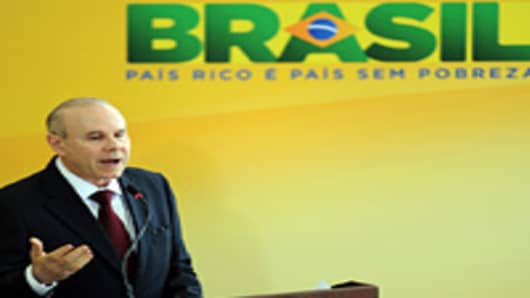Guido Mantega, Brazil’s finance minister, has warned that the U.S. Federal Reserve’s “protectionist” move to roll out more quantitative easing will reignite the currency wars with potentially drastic consequences for the rest of the world.
“It has to be understood that there are consequences,” Mr. Mantega told the Financial Times in an interview on Thursday.
The Fed’s QE3 program would “only have a marginal benefit [in the U.S.] as there is already no lack of liquidity...and that liquidity is not going into production.”
He said it was instead depressing the dollar and aimed at boosting U.S. exports.
As finance minister under President Dilma Rousseff and former president Luiz Inácio Lula da Silva, Mr. Mantega has watched Brazil’s economy move from confident boom to near-stagnation this year.
He cited Japan’s decision this week to expand its own QE program, coming on the heels of the Fed’s decision to launch further QE last week, as evidence of growing global tensions. “That’s a currency war,” he said.
Mr. Mantega coined the phrase currency wars two years ago when the second round of QE by the Fed pushed a wall of money abroad, leading to a punishing appreciation of many emerging market currencies, especially Brazil’s.
The Fed announced last week that it would begin a new program of unlimited purchases of mortgage-backed securities — nicknamed QE3 — and promised to keep it going until the labor market improved. Combined with its purchases of long-dated Treasuries under “Operation Twist”, this will see the Fed buying a total of $85 billion of assets a month for the rest of the year, similar to its QE2 program in 2010.
The Bank of Japan on Wednesday said it would buy another Y10tn ($128 billion) of government bonds, expanding its asset-purchasing program to Y80tn – an operation aimed in large part at weakening the yen.
Mr. Mantega said Brazil had “so far only seen the consequences of a change in expectations” from the launch of QE3 as the resources had not yet been released. “Risk aversion has fallen and animal spirits have increased,” he said.
But continued QE policies would hurt trade throughout the world, from emerging economies to developed world exporters such as Germany and Japan.
“Japanese companies were complaining about their strong exchange rate. If a weaker dollar leads to rising trade competition, then that will also force Brazil to adopt measures to stop the real strengthening,” Mr. Mantega said.
He did not spell out what those policies might be. But Brazil has deployed a variety of measures since 2010 to stop the real from strengthening – including a tax on portfolio inflows – some of which have been reversed recently. The real traded on Thursday at R$2.02 to the dollar, around a third weaker than its July 2011 peak of R$1.52.
“I would say today the currency is at a reasonable value, still overvalued against a basket of Brazil’s trading partners, but at current levels [it is] helping make Brazilian companies more competitive.”
Brazil has cut interest rates by 500 basis points over the past year to foster an economic recovery that Mr. Mantega said would produce 2 per cent economic growth this year and up to 4.5 per cent next year. He said criticisms that Brazil was protectionist were “a myth”, and that a controversial reduction of quotas of cars imported from Mexico was an example of a legitimate “commercial defense measure”.
“The U.S., Europe and the UK are more protectionist than Brazil,” he said.


